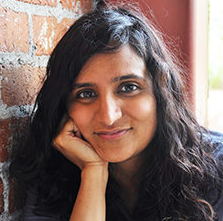Gowri Krishna
Associate Professor of Law, New York Law School
New York Law School Nonprofit & Small Business Clinic
How did you get into this work?
After law school, I went to the Community Development Project (CDP) at the Urban Justice Center, a nonprofit legal services organization that works with grassroots and community-based organizations throughout NYC. Even though attorneys there had just finished up forming Colors restaurant, a worker-owned restaurant started by the Restaurant Opportunities Center New York (ROC-NY), I got to learn about cooperatives, particularly from the angle of worker centers and other nonprofit organizations developing worker cooperatives as a way for low-wage, often immigrant workers to create and operate their businesses. In those early years, I also worked with Green Worker Cooperatives in an initiative to create a business that sold recycled or surplus building supplies. In 2008, I met staff from the Center for Family Life in Sunset Park who were developing their first worker cooperative—Si Se Puede Women’s Cooperative. I began working with the coop, researching new and tricky areas of law to figure out what options would be best for the immigrant-run coop. I got to see first-hand how women in the coop took on leadership roles and ownership over the business, finding strength collectively, and taking home more pay with less time worked (meaning more time with their families) than before. My work with Si Se Puede began an over-ten year relationship with CFL and their cooperatives. In that time, the NYC and national coop economy has grown. I continued working with coops after CDP. I spent time in Michigan and Rhode Island and had a chance to see how coops and other solidarity economy structures have taken root outside of NYC. At New York Law School, I run a clinic where law students get credit for working with real clients under my supervision. We have taken on a number of clients and matters related to coops, and I hope to continue this in the future. Students get to learn about the solidarity economy, play a small role within it, and who knows what kind of interest and future involvement it will inspire!
What does ‘solidarity economy’ mean to you?
To means, the solidarity economy is a way of naming the vast range of efforts to create a way of life and work that builds on values such as cooperation, democratic participation, sustainability, and economic, racial, social and environmental justice.
What are the biggest challenges you face in this work?
From the perspective of a lawyer doing this work, the biggest challenge is thinking through both how we can fit solidarity economy structures into the current legal schemes, and also how we can push to change laws and regulations to fit our solidarity economy structures. This requires some creative thinking, starting from a place of “yes, let’s figure this out,” and being willing to take some risk.
Why do you think it is important for cooperatives to help other cooperatives?
The solidarity economy requires a mindset of cooperation and collaboration with the end goal being that of transformation of society as a whole. If cooperatives remain siloed, then they lose out on the potential for collective transformation.
What is your ‘theory of change’?
This is a tough question, and one that I think is constantly evolving. As a central tenet, I believe sustainable, systemic changes comes from creating structures and processes that center and give power to the most vulnerable and oppressed among us. The challenge lies in doing so in a way that does not re-create hierarchies.
Where can we find more information about the work you are doing in the future?
For those looking for legal assistance, we have a webpage with information about the type of work we help with and a link for applying: http://www.nyls.edu/smallbizclinic.
What is the best way for people to get involved and support your work?
By email: Gowri.krishna@nyls.edu or through the link above if interested in becoming a client of the clinic.

